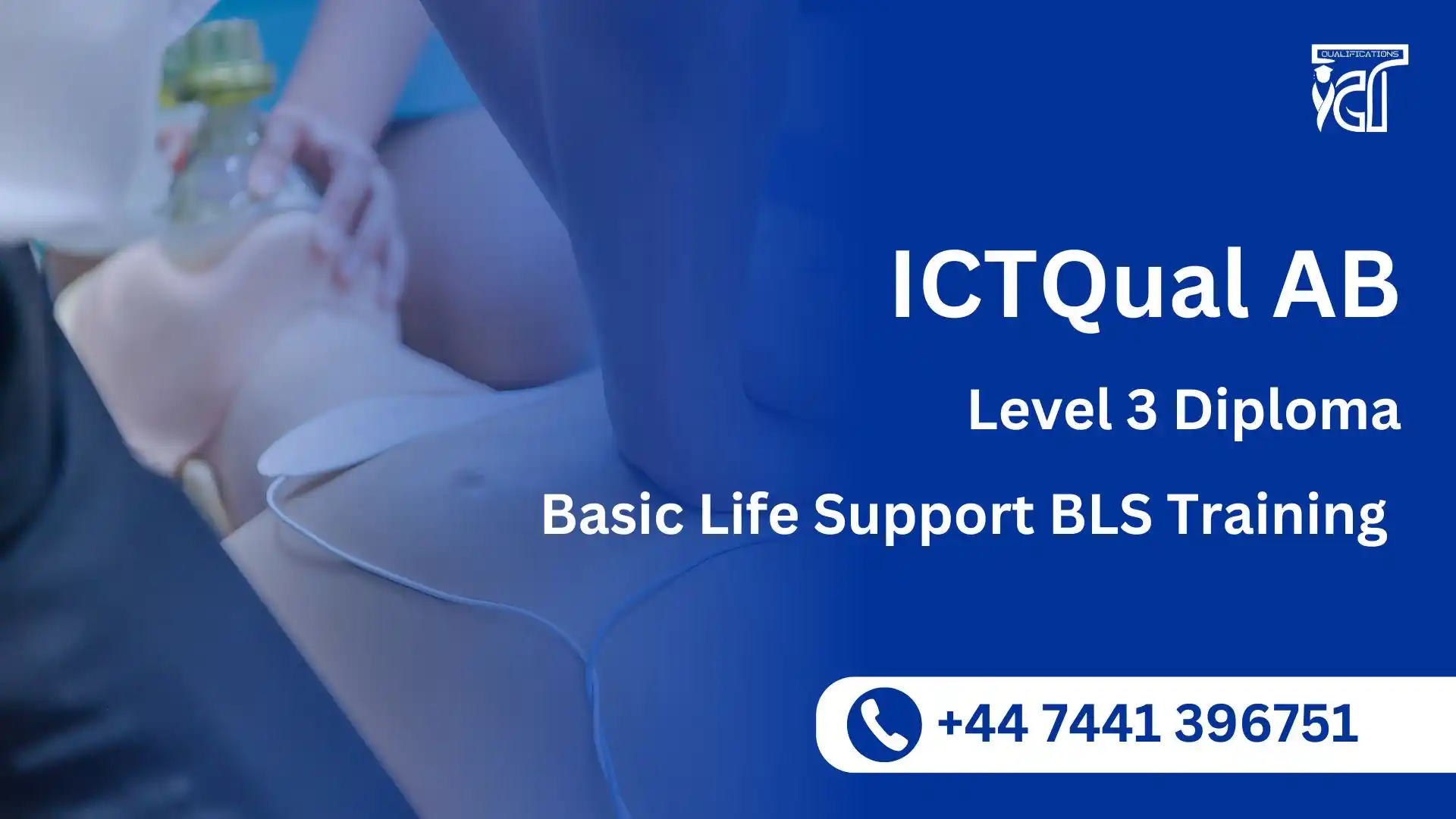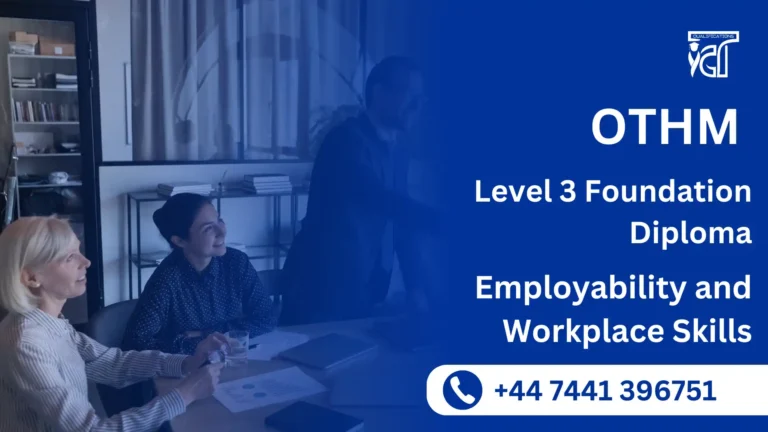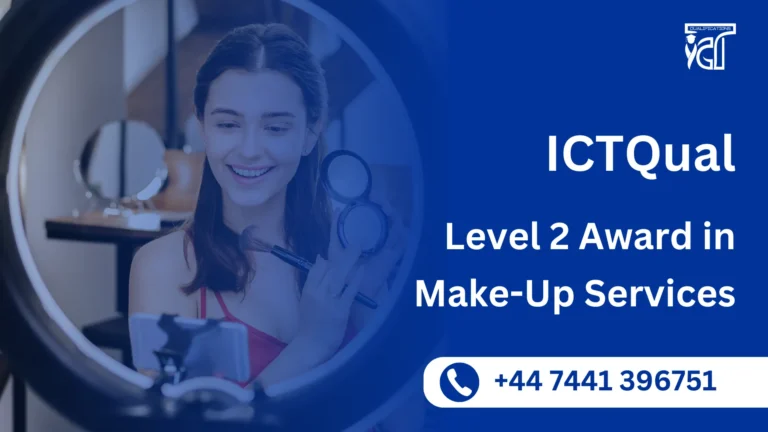The ICTQual AB Level 3 Diploma in Basic Life Support (BLS) Training is designed to equip learners with the essential knowledge and practical skills needed to respond effectively in life-threatening emergencies. This comprehensive qualification covers critical aspects of first aid, cardiopulmonary resuscitation (CPR), and the management of airway obstruction in adults, children, and infants.
The ICTQual AB Level 3 Diploma in Basic Life Support (BLS) Training is a comprehensive program designed for individuals seeking essential life-saving skills required in emergency situations. This accredited course covers critical techniques such as Cardiopulmonary Resuscitation (CPR), Automated External Defibrillator (AED) usage, and the management of choking, shock, and unconscious casualties — skills crucial for healthcare professionals, first responders, and anyone responsible for workplace or public safety.
Through practical demonstrations and hands-on training, learners will gain the confidence and competence needed to respond effectively during life-threatening incidents. This BLS qualification meets international standards and enhances professional development for those working in healthcare, education, childcare, security, and other safety-critical sectors.
ICTQual AB Level 3 Diploma in Basic Life Support BLS Training
Following are the study units of ICTQual AB Level 3 Diploma in Basic Life Support BLS Training:
The ICTQual AB Level 3 Diploma in Basic Life Support BLS Training qualification consists of 6 units and 18 Credits for the complete qualification.
- Comprehensive Emergency Life Support
- Advanced Airway and Respiratory Management
- Trauma Life Support and Multi-System Emergencies
- High-Performance Resuscitation Techniques
- Pharmacological Interventions in Life Support
- Leadership, Crisis Management, and Team Coordination
GLH (Guided Learning Hours) and TQT (Total Qualification Time) are terms commonly used in vocational qualifications to help define the amount of time a learner is expected to spend on their studies.
1. GLH (Guided Learning Hours)
GLH refers to the number of hours a learner spends being directly taught, supervised, or supported during their course. This includes the time spent in activities such as:
- Classroom instruction
- Practical workshops
- One-on-one tutoring or mentoring sessions
- Online learning sessions with tutor support
In other words, GLH represents the time that learners are actively engaged with their instructors or learning activities.
2. TQT (Total Qualification Time)
TQT represents the total amount of time a learner is expected to invest in completing a qualification, including:
- GLH (Guided Learning Hours): Time spent on direct learning, as explained above.
- Self-Directed Learning: This includes time spent on independent study, research, assignment completion, preparation for exams, and any other work the learner does outside of direct teaching hours.
TQT is a broader measure that includes all the time required to achieve the qualification. It helps learners and employers understand the overall commitment required for the qualification.
Key Differences Between GLH and TQT:
- GLH focuses on direct learning with guidance or supervision.
- TQT includes GLH as well as independent study time and other learning-related activities.
Example:
If a qualification has a TQT of 600 hours and a GLH of 250 hours, it means the learner should spend 250 hours in direct learning (classroom, online, or tutor-led sessions) and 350 hours on independent study or research.
Here are the learning outcomes for each study unit of ICTQual AB Level 3 Diploma in Basic Life Support BLS Training:
Comprehensive Emergency Life Support
- Understand the principles of emergency life support and their application in critical situations.
- Identify life-threatening conditions and initiate appropriate interventions.
- Demonstrate proficiency in performing cardiopulmonary resuscitation (CPR) and defibrillation.
- Assess and manage patients experiencing cardiac, respiratory, and neurological emergencies.
Advanced Airway and Respiratory Management
- Recognise and respond to airway obstruction and respiratory distress in different patient groups.
- Demonstrate techniques for advanced airway management, including endotracheal intubation and supraglottic airway devices.
- Apply oxygen therapy and ventilation strategies based on patient needs.
- Understand the physiological impact of respiratory failure and appropriate interventions.
Trauma Life Support and Multi-System Emergencies
- Assess and manage trauma patients using structured approaches such as the primary and secondary survey.
- Identify and treat life-threatening traumatic injuries, including haemorrhagic shock, fractures, and head trauma.
- Apply principles of spinal immobilisation, wound management, and haemorrhage control.
- Coordinate care for multi-system trauma patients in pre-hospital and hospital settings.
High-Performance Resuscitation Techniques
- Implement evidence-based resuscitation techniques to improve survival rates in cardiac arrest cases.
- Demonstrate high-performance team-based resuscitation, optimising roles and responsibilities.
- Apply rapid assessment and intervention strategies in high-pressure resuscitation scenarios.
- Evaluate post-resuscitation care and strategies for improving patient outcomes.
Pharmacological Interventions in Life Support
- Understand the pharmacokinetics and pharmacodynamics of emergency medications.
- Administer life-saving drugs in accordance with emergency protocols and patient conditions.
- Recognise indications, contraindications, and potential adverse effects of life support medications.
- Integrate pharmacological interventions with other life-saving techniques for optimal patient care.
Leadership, Crisis Management, and Team Coordination
- Develop leadership skills for managing emergency medical teams in high-stress situations.
- Implement effective communication and decision-making strategies during life-threatening emergencies.
- Coordinate multi-disciplinary teams to ensure efficient and effective patient care.
- Apply crisis management principles to enhance situational awareness and response efficiency.
Benefits of the ICTQual AB Level 3 Diploma in Basic Life Support BLS Training
Internationally Recognized Certification
Gain a widely respected Level 3 Diploma that meets global Basic Life Support (BLS) standards, enhancing your professional profile and career prospects across various industries.
Essential Life-Saving Skills
Master critical life-saving techniques including CPR, AED usage, and choking management—skills that can make the difference between life and death during emergencies.
Improved Confidence in Emergency Situations
Build the confidence to respond quickly and effectively to cardiac arrests, respiratory failures, and other life-threatening conditions at home, in the workplace, or in public settings.
Compliance with Health & Safety Standards
Ensure your workplace meets legal and safety obligations by equipping staff with up-to-date emergency response training certified by ICTQual AB.
Career Advancement Opportunities
Stand out in healthcare, security, education, childcare, and public service sectors with a qualification that is often a requirement or strong asset in job applications and promotions.
Hands-On Practical Training
Learn through real-life scenarios and practical demonstrations that prepare you for actual emergencies, not just theoretical knowledge.
Applicable Across Multiple Sectors
Whether you are in healthcare, education, construction, or customer service, these universal life support skills are valuable and relevant.
Personal Empowerment & Social Responsibility
Equip yourself to save lives—not just professionally, but also for family, friends, and community members in everyday situations.
Who is the ICTQual AB Level 3 Diploma in Basic Life Support BLS Training Best Suited For?
The ICTQual AB Level 3 Diploma in Basic Life Support (BLS) Training is designed for anyone who wants to gain essential life-saving skills and be prepared to act confidently in emergency situations. This course is especially beneficial for:
Healthcare Professionals
- Doctors, nurses, paramedics, and medical support staff who require certified BLS training as part of their professional qualifications.
Teachers, Childcare Providers, and Caregivers
- Individuals working in schools, nurseries, eldercare, and home care settings who must ensure the safety and well-being of those in their care.
Workplace First Aiders and Safety Officers
- Designated first responders in offices, factories, construction sites, and other workplaces responsible for handling health emergencies.
Security Personnel and Public Service Workers
- Security guards, police officers, fire service members, and community workers who may be first on the scene during public emergencies.
General Public and Concerned Citizens
Anyone who wants to be prepared to help family, friends, or strangers in life-threatening situations, whether at home, during travel, or in public spaces.
Entry Requirements
Register Now
Qualification Process
Qualification Process for the ICTQual AB Level 3 Diploma in Basic Life Support BLS Training
- Self-Assessment:
Begin by evaluating your eligibility to ensure you meet the qualification requirements, including work experience, knowledge, and language proficiency. - Registration:
Complete your registration by submitting the required documents, including a scanned copy of a valid ID, and paying the registration fee. - Induction:
An assessor will conduct an induction to confirm your eligibility for the course and explain the evidence requirements. If you do not meet the criteria, your registration will be canceled, and the fee will be refunded. - Assignmnets & Evidence Submission:
Provide all assignmnets and the necessary evidence based on the assessment criteria outlined in the course. If you are unsure of the required evidence, consult with the assessor for guidance on the type and nature of evidence needed. - Feedback and Revision:
The assessor will review your submitted evidence and provide feedback. Evidence that meets the criteria will be marked as “Criteria Met,” while any gaps will be identified. You will be asked to revise and resubmit if needed. - Competence Evidence:
Submit final evidence demonstrating that all learning outcomes have been met. This evidence will be marked as “Criteria Met” by the assessor once it is satisfactory. - Internal Quality Assurance (IQA):
The Internal Quality Assurance Verifier (IQA) will review your evidence to ensure consistency, quality, and compliance with standards. - External Verification:
The IQA will submit your portfolio to ICTQUAL AB External Quality Assurance Verifiers (EQA) for final confirmation. The EQA may contact you directly to verify the authenticity of your evidence. - Certification:
Upon successful completion of all checks, ICTQUAL AB will issue your official certificate, confirming that you have attained the ICTQual AB Level 3 Diploma in Basic Life Support BLS Training.







